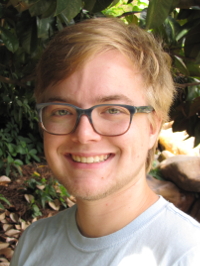2019 NIMBioS-NSA REU Program Participant Profile:
Lucas Fiet
 |
Hometown: Knoxville, TN
|
Why did you apply to the SRE program?
Over the course of my first few years of college, I realized how incredibly broad and diverse the subject of mathematics is. I thought an SRE focused on the applications of math to biology would be a great way to explore an area I hadn't tried my hand at before.
![]()
I really enjoyed the feeling of working hard on something and knowing I was making a real contribution to the scientific community.
![]()
– Lucas Fiet, SRE participant
What is the purpose of your research?
My group is working on exploring the population dynamics of phytoplankton and the viruses that infect them by using mathematical models to fit existing data. Specifically, we are interested in how environmental conditions like light intensity or nutrient availability affect the interactions. We use a lot of programming to work with the equations that represent how the plankton grow, are infected, and die.
Describe a typical day on the job.
My days usually consist of collecting and preparing data from existing papers, programming, and writing. For the most part, my group works together in one room where we have white boards and projectors and the like. We spent a lot of our time at the beginning talking about what kinds of factors we wanted to include in the model, and testing different approaches, too. After work we often hang out with the other groups participating in the SRE, and we also meet with our mentors a few times each week.
Tell us something about your field of study we would be surprised to know.
Something I find great about the field of mathematical biology, that I didn't realize at first, was the level of interaction that happens across fields all the time. You have chemists, biologists, mathematicians, ecologists, computer scientists, and statisticians all working together and collaboration on the same projects. It's really incredible how much you can get done when everyone shares their expertise, and I never expected this collaboration to be happening on such a broad and large scale.
Do you have an interesting "personal side" to your research experiences?
If you had asked me two years ago what kind of math I liked the most, I definitely would have said pure math, and turned up my nose at all kinds of applied uses for math. Nowadays, I've realized through this research and other experiences that the distinction between "pure" and "applied" is much fuzzier than I initially thought, and that both areas can be equally fascinating for entirely different reasons.
What were your favorite parts of the SRE program? Explain.
I really enjoyed the feeling of working hard on something and knowing I was making a real contribution to the scientific community. The social experiences were also really fun, and it was really nice to hang out with so many people who are so highly motivated and have similar interests to mine.
What advice would you give someone who's interested in/curious about participating in the program?
One thing I worried about was not knowing enough biology, since I mostly study math and haven't taken biology since high school. I would tell anyone who is concerned about not knowing enough about one subject or another to not worry about that. You pick up a lot of what you need to know on the job, and you also work with a great group with a diverse background who all share their knowledge.
Would you recommend our program to others?
Definitely! It's a really fun way to get hands on research experience and can be a great way to get a sense of your research interests and talents. It's also encouraged me to be more interested in going to grad school because I realized I could see myself doing more of this type of work.
Is there anything else you'd like to add?
Until my senior year of high school, I wanted to be an English major! I tell people that all the time because I think people restrict themselves when they say, "Oh, I'm a humanities person" or "Oh, I'm only good at STEM stuff." There's so much out there to try, and it's very possible you're good at and interested in more than you think you are. And on top of all the work I'm doing in STEM, I'm still getting a religious studies minor. I highly recommend everyone try to expose themselves to both STEM and humanities classes and subjects during college. It makes you appreciate both areas more and makes you a more balanced person.
NIMBioS
1122 Volunteer Blvd., Suite 106
University of Tennessee
Knoxville,
TN 37996-3410
PH: (865) 974-9334
FAX: (865) 974-9461
Contact NIMBioS


